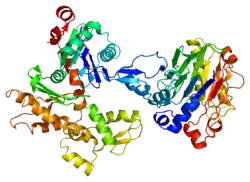T98G
T98G is a glioblastoma cell line used in brain cancer research and drug development.[1][2]

The T98G cell line was derived from a 61-year-old human male and has a hyperpentaploid chromosome count with a modal number ranging from 128 to 132. The cells are not tumorigenic in mice, but do proliferate with proper anchorage in cell culture.[1] T98G cells are known for having high expression of the ACTA2 gene, which is involved in cell motility and structure.[3] T98G cells are polyploidy variants of the parent T98 cell line, and can stay in the G1 phase of the cell cycle under stationary conditions.[1]
T98G cells have been investigated along with A172 cells for drug cytotoxicity,[3] and were found to be resistant to cisplatin, with larger cytotoxic effects induced by viral-mediated production of the p53 protein.[4]
References
- Stein, Gretchen (April 1979). "T98G: An anchorage‐independent human tumor cell line that exhibits stationary phase G1 arrest in vitro". Journal of Cellular Physiology. 99 (1): 43–54. doi:10.1002/jcp.1040990107. PMID 222778.
- "SOP: Thawing, Propagation and Cryopreservation of NCI-PBCF-CRL1690 (T98G)" (PDF). PBCF. Retrieved 3 May 2018.
- Kiseleva, L; et al. (September 2016). "A172 and T98G cell lines characteristics". Cell and Tissue Biology. 10 (5): 341–348. doi:10.1134/S1990519X16050072.
- Park, Jong; Kim, Tae (2002). "Cisplatin-Induced Apoptosis by Cisplatin in Human Glioblastoma Cell Line". Journal of Korean Neurosurgical Society. 31 (6): 574–584.